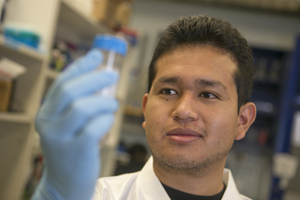IRACDA Scholar: Wilson Nieves Vasquez, Ph.D.
Wilson Nieves Vasquez
PhD: Biophysics, UCSF
IRACDA Placement: Laufer Center and Department of Biochemistry and Cell Biology

Email: wilson.nievesvasquez@stonybrook.edu
Wilson earned his Ph.D. in Biophysics from the University of California, San Francisco, where he conducted his doctoral research in the Mullins Lab. His work focused on reconstituting actin cytoskeletal systems to understand how Capping Protein, CARMIL, and related regulators control cell motility. His research integrates advanced protein biochemistry, microscopy, and quantitative modeling to explore the emergent behaviors of molecular assemblies. With a strong interest in bridging experimental and computational biology, Wilson aims to uncover general principles of molecular organization that underlie cellular function and disease. Beyond research, he is passionate about teaching and mentoring—particularly supporting students from diverse backgrounds through hands-on laboratory experiences. As an IRACDA Postdoctoral Fellow, Wilson is developing innovative, inquiry-based approaches to teaching molecular and cellular biophysics while continuing to investigate the physical rules that govern self-organization in biological systems.
Wilson’s current research explores how the cytoskeleton influences mitochondrial organization and function, seeking to uncover how dynamic protein networks regulate energy distribution, molecular organization, and overall cellular health.
Why I chose to join Stony Brook IRACDA : I joined the IRACDA program to strengthen my teaching skills and develop innovative, laboratory-based courses that make complex biological concepts tangible through experimentation. I am passionate about helping students discover the excitement of scientific inquiry by engaging directly with the tools and processes of research. Through IRACDA, I hope to integrate my research experience with evidence-based teaching to create learning environments that foster curiosity, confidence, and creativity in the next generation of scientists.
